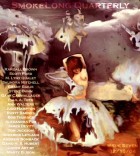First of all, on a personal note, I want to thank you for all the time you took with me discussing the business of lit mags. Night Train and its staff have deeply impressed me. Tell us a little about your role there and how it’s affected your writing.
You’re welcome, Dave; it’s was a pleasure talking to you. I hope I was of some help. Feel free to call anytime, really.
Hmmm, my role at Night Train… mostly I’m the “unmitigated gall” guy. I’m the one who goes around asking almost complete strangers for money so we can publish our book. Never having been a salesman in my life, it’s been a challenge, to say the least. I also do things like help set up our “Rail Stop” location readings (nail down locations, food, create the printed programs, etc.). I’ve served as reading host, served as taxi service for the reading talent, arranged their flights and hotel accommodations.
I also proofread the stories for each issue, do a primary formatting. I also supervise the creation of the “Rail Stop” section for each issue—the article, the photography, the directory of participating sponsors, etc.
How has it affected my writing? Well, I’ve loved the exposure to such great, new and established authors. I’ve been blown away by a lot of their stuff. It’s inspired me a great deal. At the same time, I’ve been so busy that I haven’t had a chance to write nearly as much as I’d like. In addition to my Night Train duties (which I do solely out of love of the art and the friends I’ve made through it), I have a full-time job, which includes an hour commute each way, every day, and two kids at home, both of whom are active in sports and music.
I just bought a new laptop, and it’s going to help me a great deal with my writing—I won’t have to fight the kids for computer access anymore.
It’s not often that you see sports so deeply intertwined in such a literary piece. So which are you most a fan of? Hockey, basketball, or baseball?
Baseball. By the time I was 11, Roger Angell’s The Summer Game was my bible, I’d read Bouton’s Ball Four twice and Roger Kahn’s The Boys of Summer three times.
The hockey connection is from my father; he’s Canadian. The “Leafs jersey for Christmas” thing in my story is true. My father did get new Toronto sweaters every year growing up, and he’d told me about it, and I actually DID remember it—so my wife and I have purchased him a few new jerseys for Christmas through the years. He wears them all day long on Christmas, too.
Basketball: I’ve never been very good at it. When I was nine, living in Lincoln, Neb., I played on a city championship Y team. I was a backup center, scored no points all season long, but had some decent hops for a chunky kid with asymmetrical feet who wasn’t all that tall.
I love football, too; to hear me talking football, you’d think I was obsessed with it as much as baseball. It merely provides me a sports outlet between the World Series and Spring Training, doesn’t consume me like baseball always has. So baseball will always get at least a “guest appearance” in my stories—sort like how New York gets a little love note in all of Paul Mazursky’s films.
This is sort of a stock question around here: how do you feel about flash fiction versus other literary forms?
I think it takes amazing talent to pack such a wallop in so few words. To use what’s probably a stock answer: It takes an entirely different, but every bit as valid, skill or gift or sense of story as it does to write short fiction or novels. The old “world-class sprinter versus world-class marathoner” comparison seems to apply.
From a sheer practical note, from the perspective of a literary journal editor: Flashes are much easier to edit and format, and you can get more of them in an issue than you can novellas. As a result, you get more authors in your book, and more authors’ friends and family members want to buy copies.
What are some books that you happily loan out, never expecting to see again?
As I said before, I grew up being one of those guys who likes to read things over and over, especially when I start new stuff that doesn’t live up to the GREAT stuff I’ve already read. So I hadn’t been much to loan out books before.
That, however, has changed. I’ve sent to friends copies of each of those baseball non-fiction books listed above. I’ve also shared my copies of W.P. Kinsella’s books (not all of them baseball-related, actually), Bob Hellenga’s novels, and Robert Coover’s wonderful first novel that’s, um, sort of about baseball. Maybe I’m on a subconscious campaign to convince others that there truly IS literary, baseball-related fiction.
Night Train is a print magazine with a web presence. What effect do you think the web is having on publishing?
I believe there will always be a market, a NEED, for print. And I think that if print publications use the web right, they’ll have more support than ever.
Forgive the baseball analogy, but: About 40 or 50 years ago, Major League Baseball Commissioner Ford Frick was opposed to televising ballgames. He allowed it only if the camera view “was no better than the worst seat in the ballpark”—he feared the availability of the sport on TV would keep fans at home, instead of going through the turnstiles.
He was dead wrong, of course. TV exposure made people more curious than ever to actually go to the ballparks. Cubs games have been televised nationwide by superstation WGN for years, and as a result, Wrigley Field sells out every game, every year, and will continue to do so—whether the Cubs suck or not.
I believe we can use the web to draw writers and readers to our respective literary magazines. Just a matter of going about it the right way.


